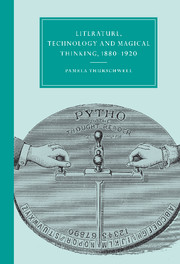Book contents
- Frontmatter
- Contents
- Acknowledgements
- Introduction
- 1 The Society for Psychical Research's experiments in intimacy
- 2 Wilde, hypnotic aesthetes and the 1890s
- 3 Henry James's lives during wartime
- 4 On the typewriter, In the Cage, at the Ouija board
- 5 Freud, Ferenczi and psychoanalysis's telepathic transferences
- Notes
- Bibliography
- Index
- CAMBRIDGE STUDIES IN NINETEENTH-CENTURY LITERATURE AND CULTURE
Introduction
Published online by Cambridge University Press: 22 September 2009
- Frontmatter
- Contents
- Acknowledgements
- Introduction
- 1 The Society for Psychical Research's experiments in intimacy
- 2 Wilde, hypnotic aesthetes and the 1890s
- 3 Henry James's lives during wartime
- 4 On the typewriter, In the Cage, at the Ouija board
- 5 Freud, Ferenczi and psychoanalysis's telepathic transferences
- Notes
- Bibliography
- Index
- CAMBRIDGE STUDIES IN NINETEENTH-CENTURY LITERATURE AND CULTURE
Summary
Intimacy between people, like occult phenomena, is fundamentally bewildering.
In 1921 Sigmund Freud was invited to co-edit three periodicals dedicated to the study of occultism. He refused all three invitations. However, according to Hereward Carrington who issued one of them, he did so reluctantly, saying to Carrington: ‘If I had my life to live over again I should devote myself to psychical research rather than psychoanalysis’. Later an irritated Freud denied ever having expressed such sentiments, and the task of imagining a Freud who traced his patients' mental illnesses to unruly ghosts rather than to unruly sexuality has been left to the occasional novelist. Freud, the full-fledged psychical researcher, was never born. But as any viewer of The X-Files knows, today's popular parapsychology owes him a great deal.
Psychical research, the scientific study of the occult which emerged as a discipline in the late nineteenth century, has usually been dismissed as a pseudo-science, an embarrassing sideline to the otherwise serious careers of figures such as William James, Henri Bergson and Henry Sidgwick. In this book I argue that, on the contrary, interest in nineteenth-century parapsychology and psychical research suffuses late Victorian literary and scientific culture, and helps spawn psychoanalysis.
- Type
- Chapter
- Information
- Publisher: Cambridge University PressPrint publication year: 2001

